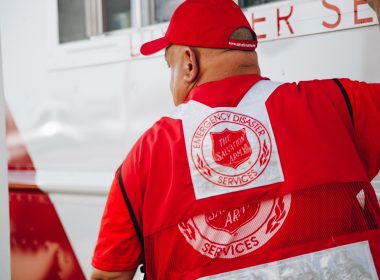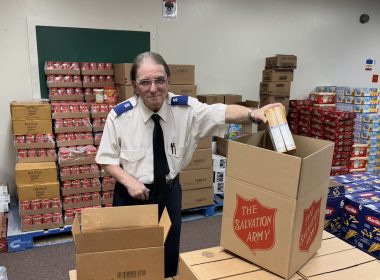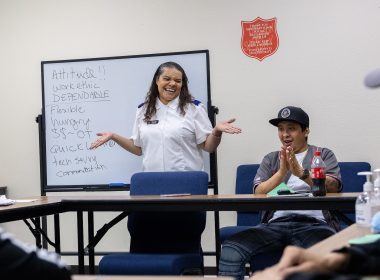EDUCATING OUR ARMY
by Major Doug O’Brien –
Principal, CFOT
Brian Wilson of the Beach Boys wrote: Catch a wave and you’re sitting on top of the world. That’s where we are–riding a wave of public admiration and support. Staying on top of the wave, however, can be a little tough.
We all know how we got here. People appreciate the Army because God has done some great things through it. People support the Army because God has poured out his grace on us. People love the Army because God has transfused our movement with his Spirit.
I love The Salvation Army. I love its discipline. I love its “can do” attitude when faced with the tough challenges of life. I love its flamboyant witness to Christ. I love its world-embracing reach. I love the way it believes in people–that people can get saved and can make a contribution to the Kingdom of God by the way they live. Over and over again in The Salvation Army God has taken people buried under the churning waves of life and lifted them up. We’re the proof of his blessing.
Remember with me the people God used to form this Army; remembering them will grow your faith in God. There was the diminutive chimney sweep Elijah Cadman, the Christian Mission giant Dr. John Reid Morrison, the homeless alcoholic Ash-barrel Jimmy, the irrepressible Joe the Turk. They were little more than driftwood left by the waves, but they were wonderfully transformed by God’s grace. He used them to build a great Army.
I didn’t know any of those early Salvationists, but I grew up knowing other officers with stories just as interesting. There was Andy Telfer, whom I always imagined as a young prizefighter. There was Ran Gifford who I always pictured as a teenager driving around bomb craters and enemy fire in France to take our doughnut girls where they were needed most. From my childhood I knew God could do wonders with anyone who trusted him.
GOD BUILDS HIS ARMY
God is still using people with remarkable experiences to build his Army. The members of the Candidates Council marvel at the trophies of grace that are recommended for their consideration. Some are recent immigrants to the United States. Sometimes they struggle with the English language. They may have difficulty documenting their education and they often know little about the United States and our Army history. Sometimes candidates for officership come from broken families, dysfunctional relationships, and physically and emotionally abusive experiences. But they have been claimed by grace to a new way of life and have answered his call to officership. Just like the little boy with his loaves and fish, God takes their varied abilities and limited training and uses them to accomplish his purposes.
In many ways, our candidates and officers are challenged today more than ever: They’re challenged when confronted by government interest in our business affairs; when they must meet societal expectations for documentation and validation of the effectiveness of our programs; when interacting with the proliferating special interest groups that compete with us both in service and for scarce resources.
In addition, the community leaders on whom our officers rely are increasingly well-educated, more sophisticated in their understanding of social needs and remedies, and more discriminating in the distribution of their resources. Of course, these challenges frustrate an inadequately prepared Army.
NEED FOR PREPARATION
Much of the officer’s energies are directed to the needs of the dysfunctional, dispossessed and disenfranchised in the community. The officer must keep on loving them as always, but the officer must also be able to give them sound counsel about the resources that will really meet their needs. Our officers today need not only to have clean hearts and ready hands, but they need to be as thoroughly equipped and as mentally prepared as any of their secular challengers.
Several years ago leaders in this territory committed themselves to a bold experiment in education. They reasoned that the training provided to cadets would stand the test of outside scrutiny and that the award of an Associate of Arts degree would encourage officers to engage in a lifetime of learning. Since that time, hundreds of cadets have been commissioned with an Associate of Arts in Ministry degree accredited by the Western Association of Schools and Colleges (WASC).
Since that time, about one in every 10 officers has been enrolled in college courses in any given year. But gaining new skills and insight a course at a time is not easy. Part time students often end up paying more for their education than full time students pay, and changes of appointment often derail officers with the best intentions to pursue further education. Nevertheless, soldiers want better-equipped officers; community leaders want better-equipped officers; God wants better-equipped officers. The question is how this might best be accomplished.
VISIONING PROCESS
In conjunction with the territorial visioning process, Salvationists envisioned a grand center for educational training where soldiers and officers, employees and volunteers could be better equipped to work for Christ. As Disney’s Michael Eisner might say, the process of imagineering is now underway. Under the leadership of the Chief Secretary Colonel Phil Needham, a steering committee is being formed that will clarify objectives, identify financial and personnel resources, and will recommend time parameters during which the objectives should be met.
Some key components are already well known. By late spring, the offices of Territorial Headquarters will have vacated Crestmont for their new Long Beach offices. Space utilization proposals that will commit Crestmont resources to a full service training center are being considered now. In addition to the excellent Training College facilities, dedicated space will be provided for short term large group functions, useful breakout rooms for smaller group sessions, meal service and attractive overnight accommodations, a permanent home for the Western Territory Museum and improved student service facilities.
Crestmont must secure capital resources. Buildings that have been used as offices will need to be converted to educational purposes. Using current buildings and remodeling other existing buildings, Crestmont will comfortably accommodate no more than 120 people–whether they are conference delegates, students or cadets. This number would be increased if adequate family housing was developed for cadets and factored into the total capacity. The college has hired Olivia Yates as Development director to help address these and other issues. Her careful planning and tactful approach has already proven helpful to the process.
PILOT DEGREE PROGRAM
In addition to the commitment of Crestmont physical resources, administration has agreed to another bold strategy to equip its officers. Beginning this June, new lieutenants will enroll in a pilot program consisting of four specially designed degree programs for officers: Bible and Christian Ministries, Applied Management and Leadership, Caring Min-istries, and Creative Ministries. Forward 2000 cadets have already chosen which Bachelor of Arts degree program they will follow. Preliminary planning for the pilot proposes that each summer for the five years they are lieutenants, they will have a two-week residential session at Crestmont. They will take three courses during each of those sessions.
The proposal also requires that the lieutenants will complete two distance learning courses a year from their appointments by logging on to the Crestmont College Internet web page. The degree programs expect to give credit for supervised work in the lieutenants’ appointments. Credit will also be given for the officer-to-officer mentoring program in which the lieutenants participate.
Outstanding instructors will teach the degree programs. The college will attract highly regarded Salvationists with appropriate academic qualifications to offer a world class education. These instructors will also prepare some of the distance learning courses. One of the two distance learning courses each year will be directed at meeting General Education requirements for the degree. Under the plan, the lieutenants will select courses offered by outstanding colleges and universities with whom The Salvation Army shares internet-based resources to complete these requirements.
The accrediting body, WASC, will only review existing programs. Shortly after beginning the program this June, Crestmont College should have candidate status with WASC. When formal endorsement by the Army is achieved during the first two years, documentation in support of full accreditation will be prepared and then WASC will make a site visit to Crestmont. In three years the degree programs should be fully accredited. All those lieutenants beginning the program this summer could earn an accredited bachelor’s degree by the time they are made captains.
A degree doesn’t substitute for a heart yielded to God. But neither does the possession of a good heart excuse the neglect of the gifts given to God’s people. A well-educated man or woman may be ineffective if his or her life is not directed by God’s Spirit. Likewise, a well-intentioned man or woman must be less than God intends if God’s gifts are not nurtured and developed.
Brigadier Jim Henry used to tell me about his mule-back adventures among shotgun toting moonshiners where he preached the gospel on his mountain mission circuit. I remember my mother’s vivid descriptions of prohibition speakeasies where she sang about Jesus and took up collections to keep the corps going. God blessed them and used them to grow his Army. I can’t help believing that the service of officers with that same level of commitment would not be enhanced by a quality education. These education requirements will help to sharpen the minds of our officers, stretch the horizons of their experience, and sensitize them to their own need to grow and learn.
ADDITIONAL BENEFITS
There can be other benefits from the accreditation of Crestmont College. Once courses are established for the lieutenants, other officers will find this a stable, efficient and cost effective way to improve their officer skills. These are degrees that are relevant to Salvation Army ministry. Inevitably, these same courses will be made available to soldiers and others interested in their effectiveness for Christ.
These degree offerings only begin to touch the range of specialized needs that must be addressed by the Army. I envision, however, that many of the non-degree training courses and seminars that will be offered at Crestmont will warrant recognition by Crestmont College in the form of college credit or certification.
While on the campaign trail for President of the United States, Herbert Hoover promised every American an equal opportunity to have wealth, success and happiness, or at the very least a chicken in every pot. Crestmont College won’t guarantee wealth, success or happiness–nor even a chicken in every pot. It may just keep us riding the wave –lifting our work for Christ to new heights.







